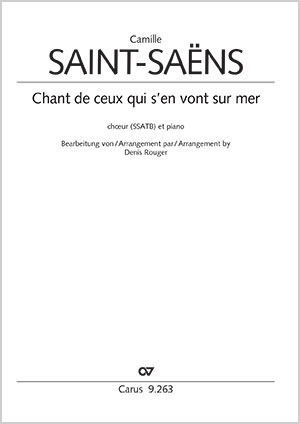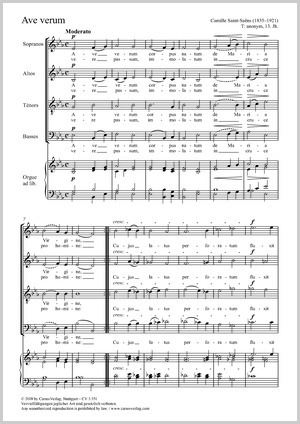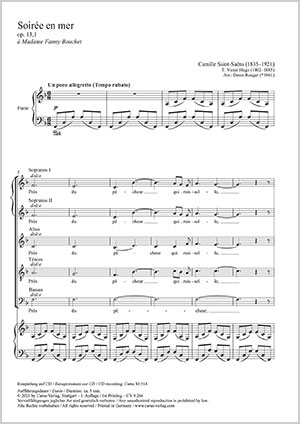Chant de ceux qui s'en vont sur mer
Arrangement von Denis Rouger 1868
In the swirling piano part you can hear the storm raging. In the midst of the raging waves and the dark tide, the sailor, filled with despair, thinks of everything which is near and dear to him and of what he fears losing. In his mind’s eye he sees his house, his beloved, and people he loves. But his home is far away, and the sky black, not “azure”. He veritably cries out his pain at parting and his fear: “Farewell, fatherland, the waves are raging. Farewell, fatherland, azure!"
This work was composed as an art song for solo voice and piano. Denis Rouger has skilfully adapted it to suit the needs and expressive possibilities of a larger ensemble, without losing any of the qualities of the original in the process. Each part in the choir has a melodic line drawn from the harmonic and rhythmic framework. In the process, the variety and refinement of the choral language combines with an enormous flexibility in form and expression, as French mélodies or German art song demand from a soloist and pianist.
The song has been recorded by the figure humaine chamber choir on the CD “Kennst du das Land ...” (Carus 83.495).
-
Composer
Camille Saint-Saëns
| 1835-1921Camille Saint-Saëns war ein wahres Multitalent. Er war Pianist, Dirigent, Organist, Musikwissenschaftler, Musikpädagoge und Komponist und erlangte vor allem durch den Karneval der Tiere und die Oper Samson et Dalila Bekanntheit.
Seine Sinfonie A-Dur komponierte er mit 15 und wurde bereits mit 16 an der Universität in Paris aufgenommen. Klavier, Orgel und Komposition studierte Saint-Saëns am Pariser Konservatorium und wurde 1852 Organist von Saint-Séverin in Paris. Im selben Jahr lernte er auch Franz Liszt kennen, welcher folgend einen Einfluss auf Saint-Saëns kompositorisches Schaffen ausübte. Ein Jahr später feierte er dann als Komponist sein musikalisches Debüt. Die Oper Samson et Dalila, die 1877 in Weimar uraufgeführt wurde, brachte ihm einen bis heute anhaltenden Erfolg an den Opernhäusern. Sein Weihnachtsoratorium Oratorio de Noël, das beim Carus-Verlag erhältlich ist, ist wohl das bekannteste seiner geistlichen Werke. Personal details
-
Songwriter / Librettist
Victor Hugo
| 1802-1885
-
Arranger
Denis Rouger
| 1961Denis Rouger grew up as the son of a family of musicians in Paris, where he learned trumpet, horn, piano and singing. He studied composition at the CNSM (Conservatoire National Supérieur de Musique), obtaining first prizes in harmony, fugue and counterpoint. He studied choral conducting in France and Holland at the Kurt Thomas Academy and received the Certificat d’Aptitude for vocal ensembles from the Ministry of Culture.
As “Professeur agrégé” at the University of Paris-Sorbonne he conducted the “Choeur de Paris-Sorbonne” and taught choral conducting for twenty years. From 1993 to 2003, he was choirmaster at Notre-Dame de Paris Cathedral and from 2005 to 2006 at the Madeleine Church, where he received the title of “Honorary Music Director.”
He has conducted numerous professional and amateur ensembles, among others in Germany – where he was invited as a guest conductor by the Landesjugendchor Baden-Württemberg and the Balthasar Neumann Chor, as well as by radio choirs in Hamburg (NDR) and Stuttgart (SWR) –, Italy, Holland, Canada, the United Arab Emirates and Switzerland (Lucerne Festival). He has also collaborated in several world premieres of contemporary works by Klaus Huber, N’guyen Thien Dao, Philippe Mazé and Yves Castagnet, among others. Denis Rouger gives master classes in choral conducting in Sweden, Bulgaria, France, Germany and Switzerland.
In April 2011, Denis Rouger was appointed Professor of Choral Conducting at the Staatliche Hochschule für Musik und Darstellende Kunst Stuttgart. The Chamber Choir of the Musikhochschule, which he founded in autumn 2011, won first prize at the International Choir Competition in Mosbach (Germany) in 2014. In collaboration with Carus the choral book French Choral Music has been published as well as the debut CD of the figure humaine kammerchor, founded in 2016 by Denis Rouger.
Personal details
Frequent questions about this work
 There are no questions and answers available so far or you were unable to find an answer to your specific question about this work? Then click here and send your specific questions to our Customer Services!
There are no questions and answers available so far or you were unable to find an answer to your specific question about this work? Then click here and send your specific questions to our Customer Services!










